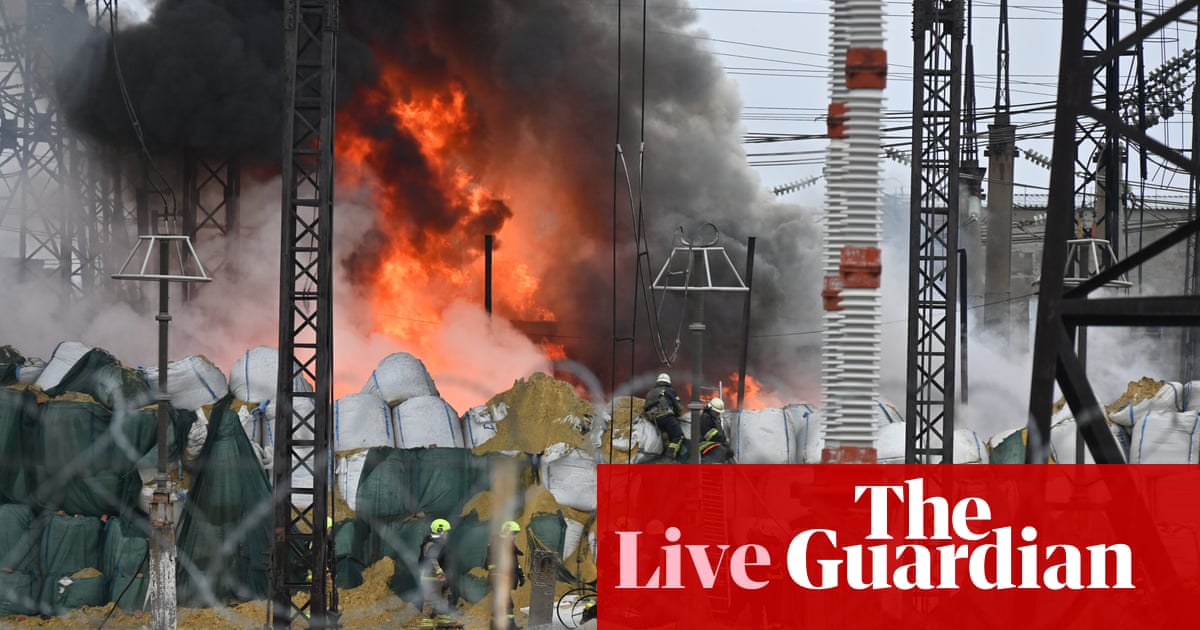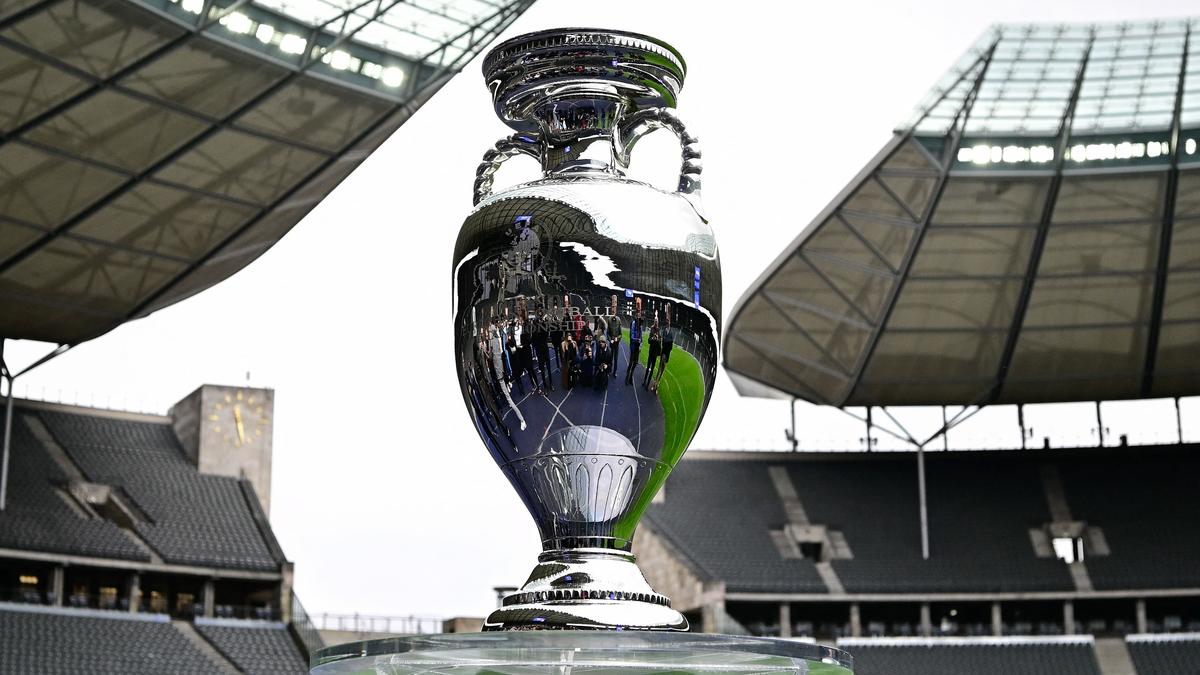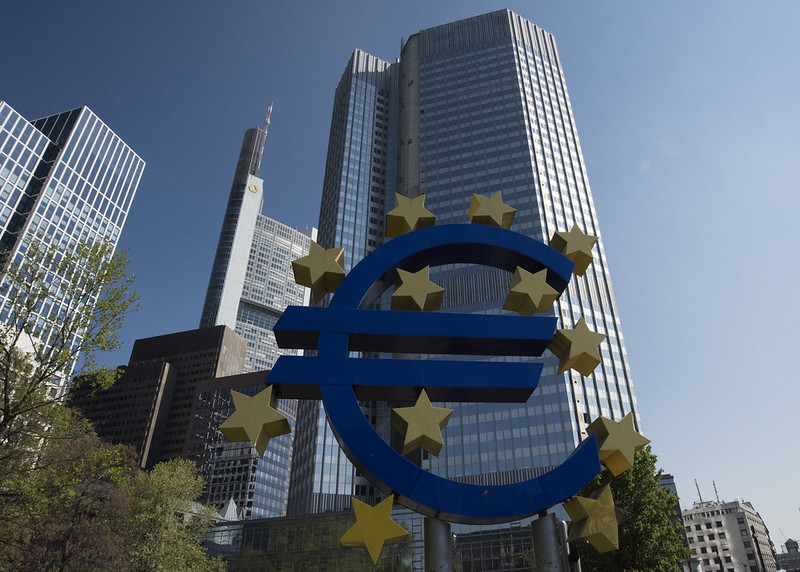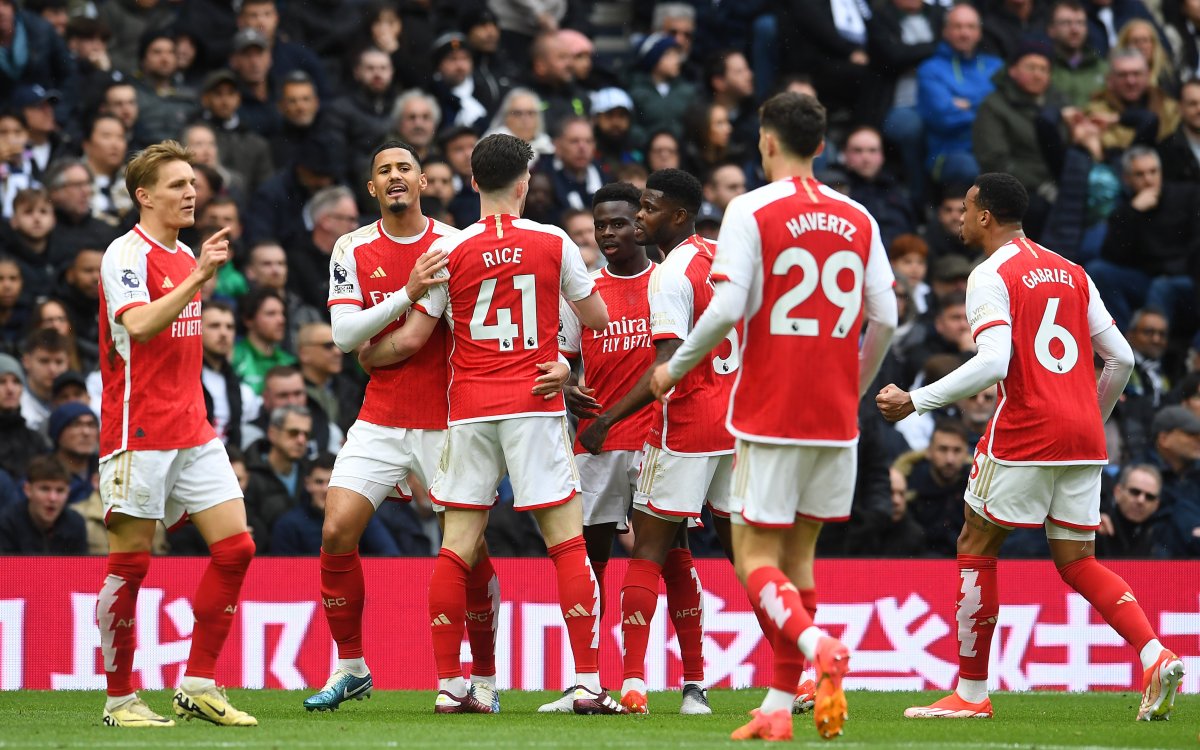Infra
‘This must stop’, says EU foreign affairs chief after Russian bombing of Ukrainian energy infrastructure – as it happened

‘This must stop’, Borrell says after Russian strikes
The EU’s high representative for foreign affairs, Josep Borrell, has spoken out after Russia targeted Ukrainian energy infrastructure.
“This must stop! All responsible will be held to account,” he wrote.
Russia continues its brutal attacks against Ukraine’s population with overnight drone & missile bombing of energy infrastructures, killing & wounding dozens, jeopardizing the safety of the Zaporizhzhia Nuclear Power Plant.
This must stop! All responsible will be held to account.— Josep Borrell Fontelles (@JosepBorrellF) March 22, 2024
Key events
Summary of the day
-
Russia launched one of its largest missile and drone attacks on the country’s energy infrastructure to date.
-
More than a million Ukrainians were left without power.
-
Ukraine’s grid is got urgent assistance from Poland, Romania and Slovakia.
-
Ukraine’s state hydropower company said that a Russian strike hit the country’s largest dam, the DniproHES in Zaporizhzhia, but that there was no risk of a breach.
-
In a sharply-worded post, Volodymyr Zelenskiy, the Ukrainian president, said “Russian missiles have no delays, unlike aid packages for Ukraine.”
-
The EU’s high representative for foreign affairs, Josep Borrell, spoke out after Russia targeted Ukrainian energy infrastructure, writing that “this must stop! All responsible will be held to account.”
-
The Kremlin stepped up its rhetoric over the conflict, saying that Russia was “in a state of war” in Ukraine.
-
The Ukrainian government responded to a report in the Financial Times that the US had urged Ukraine to halt strikes on Russian oil refineries, with the deputy prime minister, Olha Stefanishyna, saying that oil refineries in Russian territory are legitimate military targets.
-
The European Commission proposed to increase the tariffs on imports into the EU of cereals, oilseeds, and derived products from Russia and Belarus.
-
EU heads of state and government met for a second day in Brussels, where they discussed issues including agriculture and the economy.
-
EU leaders will return to the issue of raising money for defence spending via the European Investment Bank in a couple of months, Paschal Donohoe, the president of the Eurogroup, said.
-
The prime ministers of Spain, Ireland, Malta and Slovenia issued a joint statement noting that “we discussed together our readiness to recognise Palestine and said that we would do so when it can make a positive contribution and the circumstances are right.”
Ahead of the European elections in June, leaders are keeping a close eye on farmers’ protests.
In their summit conclusions today, they wrote:
The European Council reverted to the current challenges in the agricultural sector and concerns raised by farmers.
It took stock of the ongoing work at European level. The European Council invites the Commission and the Council to take work forward without delay, notably on:
a) all possible short- and medium-term measures and innovative solutions, including those to reduce the administrative burden and to achieve simplification for farmers;
b) strengthening the position of farmers in the food supply chain, in particular to ensure a fair income;
c) easing the farmers’ financial strain by designing means of additional support, such as for example extending the temporary framework on State aid, and report back to the next European Council;
d) ensuring rules-based and fair competition globally and in the internal market;
e) addressing issues related to the Autonomous Trade Measures for Ukraine in a fair and balanced way while preparing a solution in the framework of the EU-Ukraine Association Agreement/Deep and Comprehensive Free Trade Area.
The German chancellor, Olaf Scholz, has said that Europe has expanded its support for Ukraine, will buy ammunition and weapons worldwide and also use the proceeds from frozen Russian assets for this purpose.
Wir haben beim #EUCO die Unterstützung für die Ukraine massiv ausgeweitet, werden weltweit Munition und Waffen kaufen und dafür auch Erträge aus eingefrorenen russischen Vermögen nutzen. Ein klares Zeichen, dass wir weitermachen – so lange wie nötig. Und eine Ermutigung für mehr! pic.twitter.com/Ct6NPXuWBX
— Bundeskanzler Olaf Scholz (@Bundeskanzler) March 22, 2024
EU commissioner Margaritis Schinas said on Friday that the EU could strike a deal with Lebanon to stem arrivals of migrants, as Cyprus complained it was being inundated by a surge in arrivals from the Middle East.
The EU has entered agreements with several countries to help them deal with increased migration burdens, and, ultimately, prevent a spillover into the 27 member states of the bloc, Reuters reports.
Rights groups have sharply criticised the pacts. Schinas, the European Commission’s vice-president for promoting the European way of life, said a deal with Lebanon could be brokered along the lines of one the EU signed with Egypt on 17 March. Considerable preparation was required, he said.
“We had worked with Egypt for quite some time, but I consider that it’s absolutely realistic to move in a corresponding manner with Lebanon,” he said during a visit to Cyprus.
Cyprus, the EU’s easternmost state, lies just 100 miles (160 km) from Syria and Lebanon, and arrivals of asylum seekers have been rising in recent months. Lebanon is in economic crisis and also hosts hundreds of thousands of Syrian refugees.
In the space of one day – 11 March – 458 Syrians arrived in Cyprus on six small boats. This month alone, authorities have registered 533 arrivals by sea, compared to 36 in March last year.
After meeting Schinas, Interior Minister Constantinos Ioannou said:
Our country … is facing asphyxiating pressure because of the large number of Syrians arriving in Cyprus.
Nicosia wants the bloc to consider declaring parts of war-ravaged Syria safe, which would allow authorities to repatriate people arriving from there.
Here is some footage that captured the moment a Russian missile hit Ukraine’s largest dam in the southern Zaporizhzhia region during its massive overnight attack on 22 March.
Slovakia on Friday rejected European Commission criticism of its closing down of a special prosecutor’s office dedicated to fighting corruption, saying the move did not violate EU law and that such investigations would continue.
The EU’s executive Commission said on Thursday it regretted Slovakia’s move which critics have said will damage democracy in the formerly communist country of 5.5 million people.
Ending the special prosecution unit USP, after two decades of work, was a major pledge of the new government of prime minister Robert Fico, who has accused the office of bias against his party and of violating human rights, Reuters said.
In a statement, the Justice Ministry said:
This [closure] is clearly not in conflict with EU law.
Closing the office was approved by lawmakers in a fast-track procedure that had raised EU concerns and strong criticism from the opposition and president Zuzana Caputova, who has challenged changes to the law concerning sentencing and statutes of limitations at the Constitutional Court.
Tens of thousands of Slovaks have protested against the government actions.
The Commission said on Thursday it would assess the consequences of the prosecution office’s closing and “not hesitate to take action to ensure respect of EU law and the protection of the EU’s financial interests”.
Cases handled by the office are to be handed to other prosecution branches, and the Justice Ministry said the approved law gave sufficient guarantees investigations would not be compromised.
The ministry said consultations with the Commission continue and any doubts about the changes were unfounded.
Anyone who thinks that Russia will stop in the Donbas and Crimea is mistaken, French president Emmanuel Macron said at the end of a EU summit in Brussels on Friday.
Asked about Kremlin comments about Russia regarding itself as at war due to the West’s intervention on Ukraine’s side, Macron said it would be a mistake to think Russia planned to halt its aggression in the Donbas and Crimea.
He added:
By using this term, one is also even opening up uncertainty about Russia’s military objectives.

Lisa O’Carroll
The president of the European Council has said he does not want to give the impression to European citizens that the continent is on the verge of war.
Just days after he urged EU leaders to take “concrete steps to be defence-ready and put the EU’s economy on a war footing”, Charles Michel said:
“I want to be clear. On the one hand, we don’t want to spread anxiety in European societies. This is very clear. On the other hand, we must be lucid and we must tell our … citizens all across the EU.
“If we want peace and we want, security and stability it is extremely important to improve our defence capacities or defence capabilities and to build a European a true European Union in defence”.
The US has issued a statement responding to EU leaders’ decision to open accession talks with Bosnia and Herzegovina.
The United States welcomes the European Council’s decision to open accession negotiations with Bosnia and Herzegovina.
This is an important milestone in BiH’s history and a key step toward securing the country’s rightful place in the Euro-Atlantic community of nations.
The United States will continue to support Bosnia and Herzegovina’s territorial integrity, sovereignty, and multiethnic character and to help it progress toward membership in the European Union.
The United States welcomes the European Council’s decision to open accession negotiations with Bosnia and Herzegovina. This is an important milestone in BiH’s history and a key step toward securing the country’s rightful place in the Euro-Atlantic community of nations.
The…— US Embassy Sarajevo (@USEmbassySJJ) March 22, 2024
Here is the full statement from the prime ministers of Spain, Ireland, Malta and Slovenia:
We, the Prime Ministers of Ireland, Malta, Slovenia and Spain, met in the margins of the European Council to share views on the situation in Gaza and the Middle East.
We welcome the Conclusions adopted by the European Council yesterday.
We are agreed on the urgent need for an immediate ceasefire, the unconditional release of hostages and a rapid, massive and sustained increase of humanitarian aid into Gaza.
We are agreed that the only way to achieve lasting peace and stability in the region is through implementation of a two-state solution, with Israeli and Palestinian States living side-by-side, in peace and security.
We discussed together our readiness to recognise Palestine and said that we would do so when it can make a positive contribution and the circumstances are right.
Hoy, España, Eslovenia, Irlanda y Malta nos hemos comprometido a reconocer al Estado palestino.
La UE llama a un alto el fuego, a la apertura de los corredores terrestres y a impulsar una conferencia de paz que lleve a la solución de los dos Estados.https://t.co/9oo6rq0WK9 pic.twitter.com/58XdEw2SXB
— Pedro Sánchez (@sanchezcastejon) March 22, 2024
Four countries agree to recognise Palestinian state ‘when conditions are appropriate & circumstances can contribute to the successful peace process’
Together with [Spain, Ireland and Slovenia] we agreed to recognise the Palestinian State when conditions are appropriate & circumstances can contribute to the successful peace process,” Malta’s prime minister, Robert Abela, has said.
“We also agreed on the need of an immediate ceasefire, release of hostages & increase of humanitarian aid into Gaza,” he added.
Together with 🇪🇸🇮🇪🇸🇮 we agreed to recognise the Palestinian State when conditions are appropriate & circumstances can contribute to the successful peace process.We also agreed on the need of an immediate ceasefire,release of hostages & increase of humanitarian aid into Gaza. – RA
— Robert Abela (@RobertAbela_MT) March 22, 2024
The Council of the EU today formally decided to impose restrictive measures against 33 individuals and two entities linked to the death of Russian opposition politician Alexei Navalny.
“Alexei Navalny’s slow killing by the Kremlin regime is a stark reminder of its utter disregard for human life,” said Josep Borrell, the EU’s foreign policy chief.
“Today’s sanctions demonstrate our determination to hold Russia’s political leadership and authorities to account for the continuing violation of the human rights in Russia,” he said.

Lisa O’Carroll
Four EU countries – Ireland, Spain, Malta and Slovenia – are considering recognising Palestine as a state, their prime ministers have said.
In a statement signed by Leo Varadkar, Pedro Sánchez, Robert Golob and Robert Abela, the four leaders said they met yesterday on the sidelines of the summit to discuss the matter.
“We are agreed on the urgent need for an immediate ceasefire, the unconditional release of hostages and a rapid, massive and sustained increase of humanitarian aid into Gaza.
“We are agreed that the only way to achieve lasting peace and stability in the region is through implementation of a two-state solution, with Israeli and Palestinian States living side-by-side, in peace and security.
“We discussed together our readiness to recognise Palestine and said that we would do so when it can make a positive contribution and the circumstances are right.”
The EU leaders’ summit has ended.









